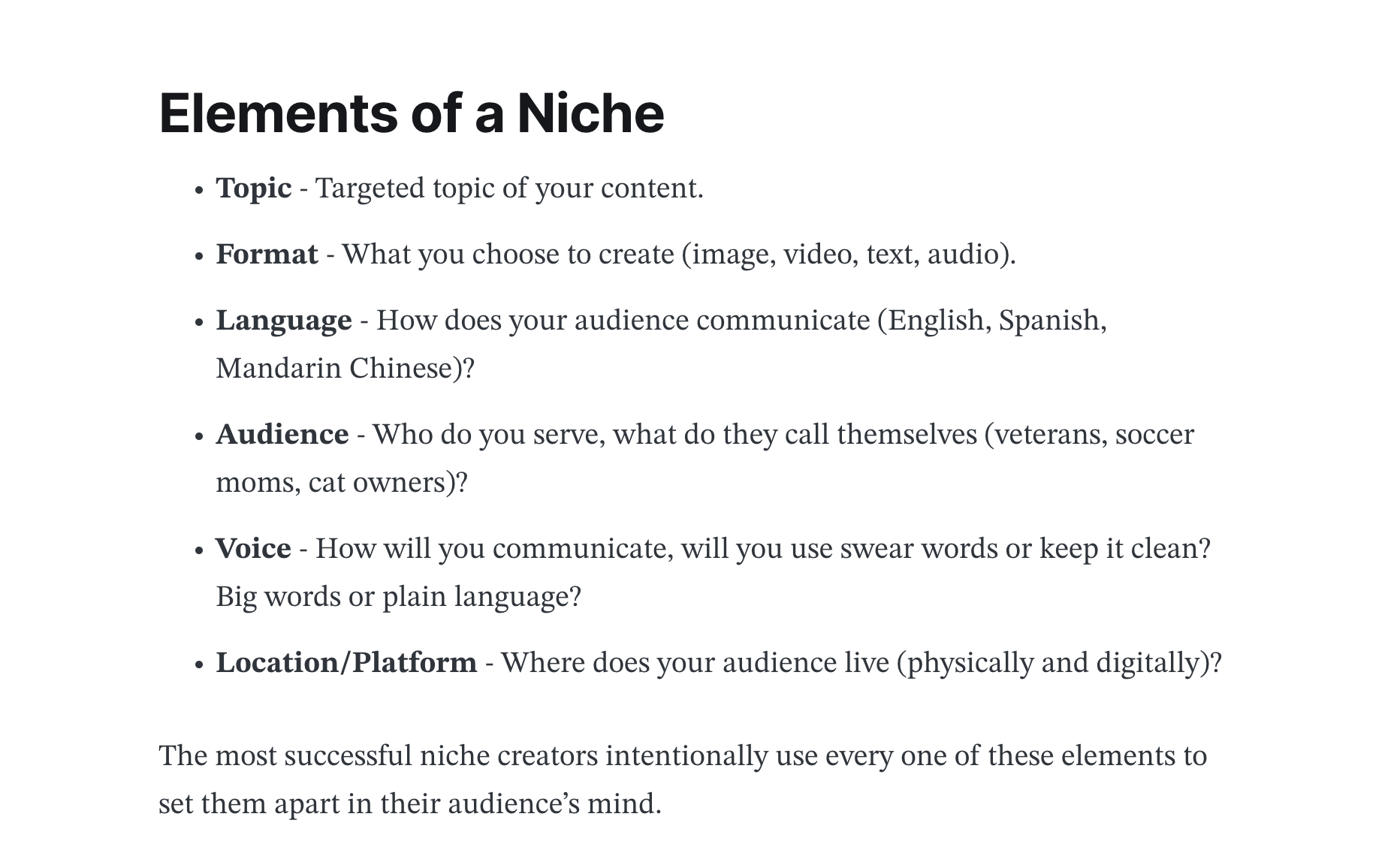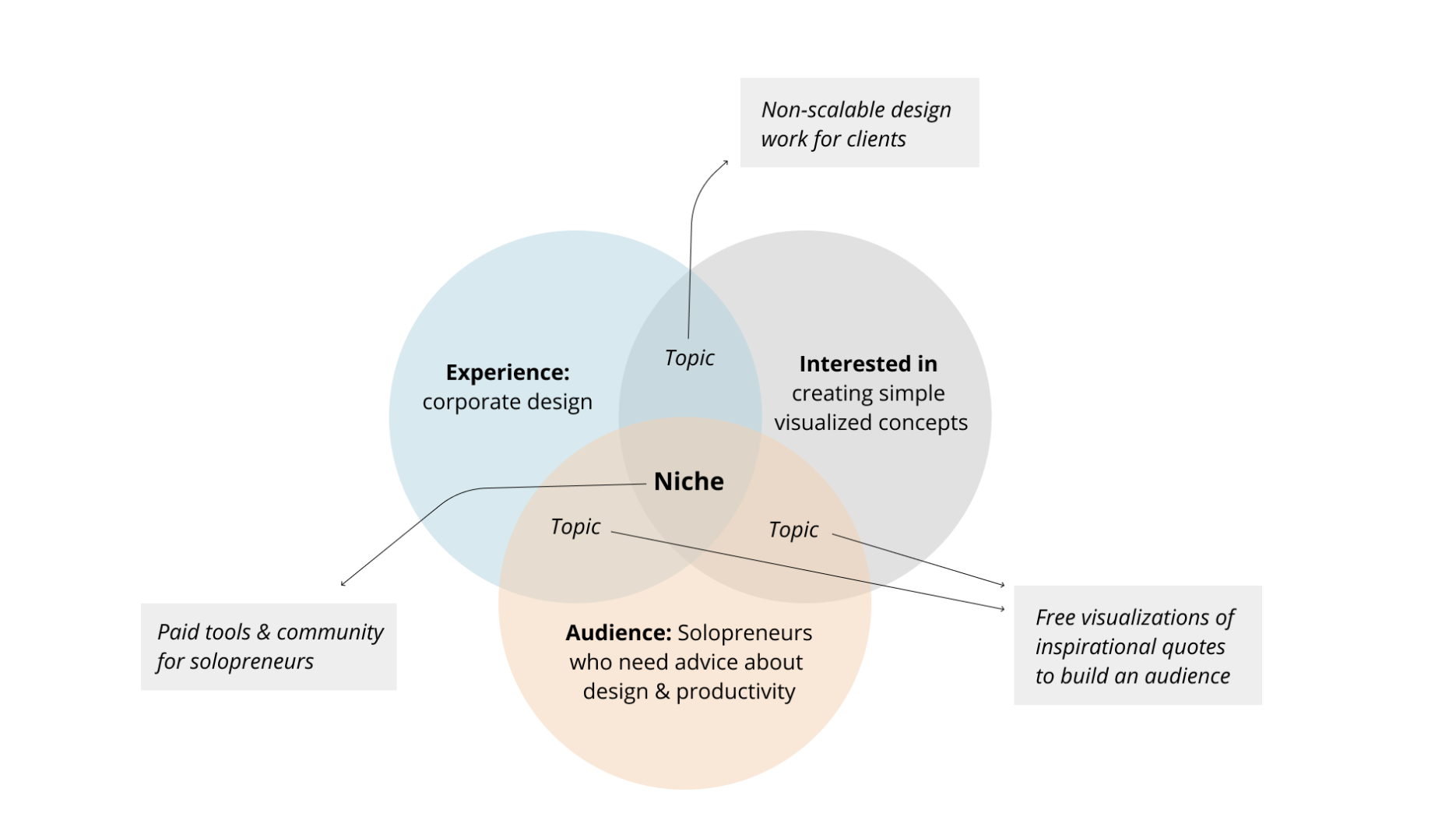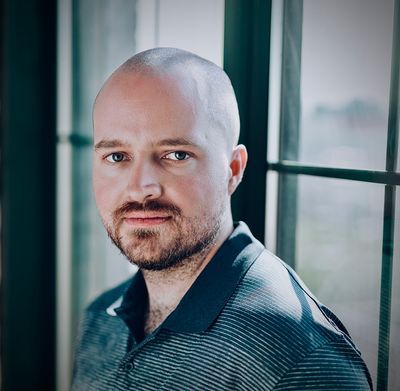Something strange is afoot in the creator economy.
Right now, I’m seeing an awful lot of backlash against the idea of niching down.
Some folks find it suffocating and isolating, like the creator equivalent of getting grounded by your parents.
Which is odd to me, because over the last six years of creator life, I've experienced the exact opposite.
Sure, niches make it easier to build a business. But I’ve also found them to be creatively rewarding and personally fulfilling. And I’ve seen the same thing with a handful of my clients, so I know I’m not an anomaly.
So what gives? Are niches the devil incarnate, or the greatest tool known to mankind?
For awhile, I chalked it up to people being wired differently. Maybe niching down works great for some, but not others.
But I always suspected there was something else going on—something subtler, yet more alarming. And think I’ve finally figured it out.
We’re lacking a common definition of “niche” that we all agree on. If you say “find your niche” to ten creators, you’ll end up with ten different interpretations of what that phrase means.
And that’s a big fucking problem.
Because if we don’t share a common language—where we agree on the meaning of everyday words—then it’s impossible for us to have a shared understanding of the world. From there, we can no longer communicate effectively, or pass along knowledge to those who follow in our footsteps. Our linguistic and conceptual landscape devolves into chaos.
And that’s what the creator discourse feels like right now. A state of perpetual confusion where the word “niche” gets thrown around all the time, but everyone’s talking about something different.
Let’s fix that, shall we?
Most definitions try to accomplish way too much
I had my big “a ha” moment after reading an article on the Ghost blog about Jack Butcher’s process for finding a niche.
I found myself agreeing with pretty much everything in the article. Creators need to find ways to differentiate themselves online. And one effective tool for doing that is weaving together various interests, skills, and personality traits into a personal brand. No complaints there.
However, I came out the other end of this article more confused than ever about what the author meant by “niche.”
Here’s the key excerpt, for those of you following along at home.

And then, a little further down in the article, we've got a handy venn diagram to help... clarify things?

Holy moly. It’s no wonder there’s widespread confusion about what a niche is.
This definition combines no fewer than five distinct aspects of creative and business strategy, and bundles them up into one mega concept.
It’s talking about the market you serve, and the needs you're meeting. It's talking about the topics you create around, and the channels you publish on. It’s talking about your positioning, branding, and how you differentiate yourself. Plus it bundles in your craft, and for good measure, the language you speak.
If your definition of niche encompasses all of these things, OF COURSE it’s going to feel suffocating and overwhelming. Most businesses—creator or otherwise—put in years of iterative work to develop that foundation. Telling new creators to figure it all out at once is the perfect recipe for an existential meltdown.
So for all you creators out there who’ve been told to find your niche, and who feel the weight of it crushing down upon you, I have good news.
There’s a much simpler, clearer definition of niches.
This new definition makes it way easier to identify the opportunities that exist all around you. And when you pinpoint a niche you enjoy, all of those other concepts—the positioning, the marketing strategy, the distribution channels, the topics—flow naturally from it.
So let’s simplify things, shall we?
A better, more useful definition of niches
Let’s start with what a niche isn’t.
- A niche is not a topic
- A niche is not a personal brand
- A niche is not the type of content you create
- A niche is not how you differentiate yourself
- A niche is not your unique voice or personality
- And it’s certainly not some combination of all these things at once
Instead, a niche is just a hyper-focused market.
It’s a group of people who congregate around a shared problem, desire, or identity.
Those people meld together into a tangible, observable subculture, with its own ecosystem of communities, media, and commerce.
A niche isn’t some abstract, nebulous concept. It’s just a group of people who come together because they have something in common. And when you “find your niche,” you’re identifying a group of people you vibe with and want to consistently make stuff for. That’s it.
Here are a few example niches from clients I’ve talked to over the last two weeks.
- Holistic health practitioners
- Blues guitarists
- Front end developers
- Ecosocialists
- Parents of kids with special needs
- People who enjoy Lovecraftian horror stories
- Newsletter writers
When Ben Thompson talks about “never-ending niches,” this is the core of it. The internet gives billions of people total freedom not only to explore their most divergent interests, but to seek out people like them, and consume media that meets their specific needs.
As such, the web is fracturing into an endless sea of sub-markets and subcultures which we, as creators, can serve with delightfully specific media.
That, my friends, is the essence of what "niche" means. It’s just a focused market. Nothing more, nothing less.
The benefits of defining niches this way
There are a few lovely things about adopting this definition of niches.
For starters, it’s not likely to induce existential panic. You don’t have to make months or years of strategy decisions all at once. No, you simply find an online subculture you enjoy, and you dive in.
From there, your niche gives you an incredible amount of creative freedom. You can talk about dozens of topics. You can create content in any format. And as long as you’re having fun and serving your people, it’ll be effective for building a business.
Lastly, adopting this definition will substantially raise your business IQ.
When the concepts of markets, positioning, branding, and distribution get rolled up into the old definition of niches, we lose out on the richness and nuance of those tools. It dulls our ability to think clearly, and move through the world with precision.
However, when you break out these tools and explore them individually, you’ll develop a deeper understanding of how business works, and how to construct yours in an intentional, effective way.
So go find your niche already. None of this is as scary or overwhelming as it seems.
And please, spread the word about this definition. Let’s clear up the confusion, so we can all focus on doing work we care about for an audience that’ll actually give a damn.

